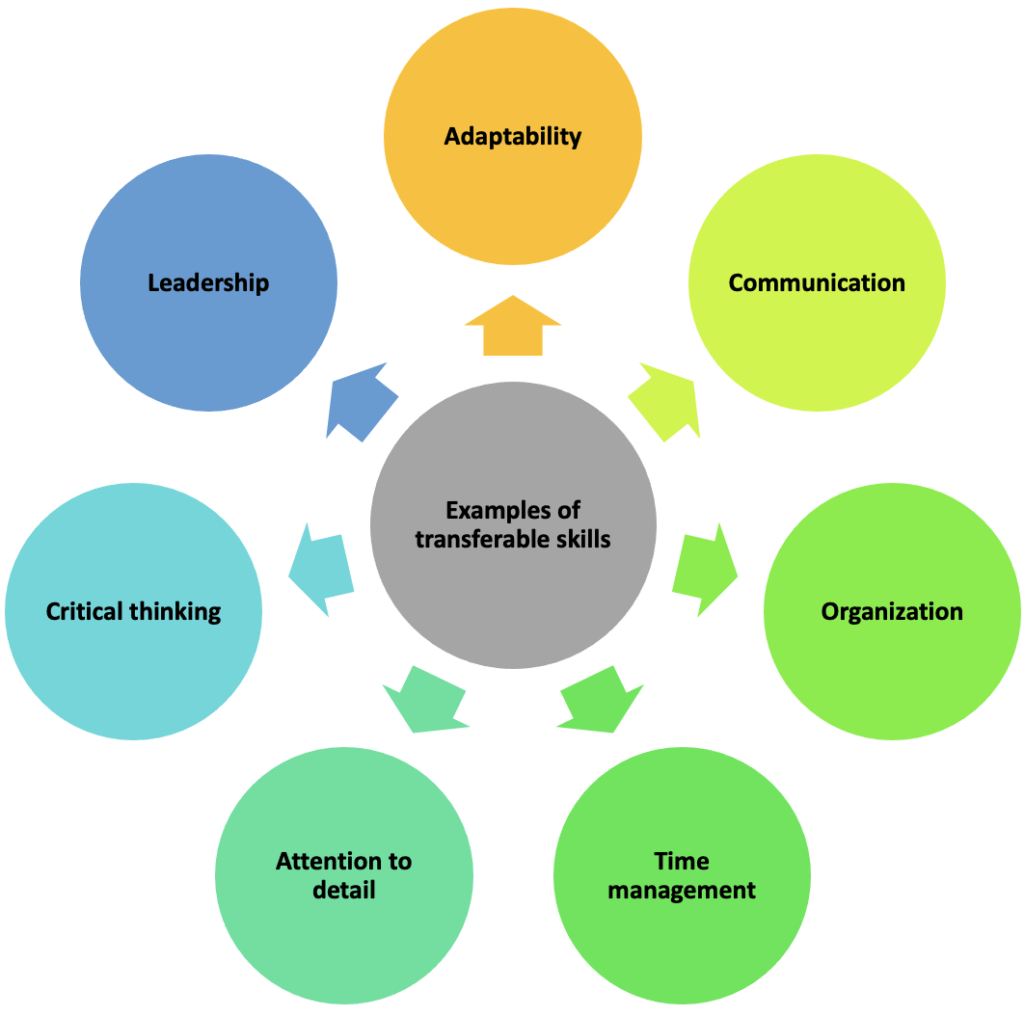
When you start school, most of us only think about how far the end is to attain that degree, but as cliche as this might sound, the future is closer than we feel it is. For some of us, we might know what we want to do with the degree that we are trying to achieve. Then there are others who hope that education will steer them toward a career path during school. Either way, it is good to start thinking about how to make the transition from school to a full-time job. At the end of the day, even though some of us might be ahead of others by knowing what our end goal is, we are all going to heavily rely on our transferable skills to make that transition smoother.
What are transferable skills?
Transferable skills help you adjust to a new position or setting in your career. These are the general core skills that you have gained throughout all of your life experiences that you can apply to that new step in your life.

These are some examples of transferable skills, but depending on the environment of your previous experiences, jobs, education, etc., you’ll attain different transferable skills.
One of the first questions that might come up when thinking about transitions in life is, “How do I know what skills I will need so I can prepare myself to be successful,” or “How do I know what I want to do with my degree?”
- If you are starting your undergraduate or graduate coursework, look for the skills you need to attain to be ready after you graduate. This, of course, will require doing some research. Some helpful places to start are job descriptions and individual testimonials on websites.
- If you know what education you want to attain but are still deciding the area you want to be in after you graduate, then look for reasons that excite you about your field of education and places you could be in with that degree. After that, see what opportunities, internships, or volunteer work you can possibly do to build connections with other individuals within the area you want to be in. At the end of the day, you never know what you’ll get out of that experience and how much it’ll shape your future.
- What has helped many individuals during school is being open-minded. You may have a very general idea of what you want to do, but until you do it yourself or see it with your own eyes, you may not know if a certain career is or isn’t for you. For example, writing essays in undergrad might not have been your favorite thing to do, but that does not mean you won’t want to be a professional medical writer. Even though you are writing in both settings, it’s much different.
Prepare yourself ahead of time. Extracurriculars are one way that can help you attain skills while doing things outside of your coursework that exposes you to possible job prospects. It is important to take advantage of all the opportunities you can because once you graduate, it is not the same as when you are a student. Being a student, you have a special advantage that some forget to utilize to learn things from others. Remember that everything you did when you were a student has shaped you become a full-time employee. Make sure to strategically approach those years, so you can get the most out of them.
Often, we hear that connections are very important. Well, this is one example where your connections might help you. If you’re going into an entry-level job, residency, or fellowship, people before you had to go through the change from being a student to a full-time employee. Don’t forget to reach out to your connections to hear how they handled their transitions. Even though your post-graduate plans may be unique or your road in life is different from others, don’t disregard others’ experiences and opinions. Connecting with others makes you more educated about life. At the end of the day, what you do will be what’s best for you.
Overall, transferable skills and preparing yourself ahead of time for that transition will help you in the long run. In the future, others may reach out to you to understand how you handled your career transition. You will be able to share your story at that time, and in sharing those experiences, you will be able to set the stage for other people’s success in their journey of finding their ideal career.
Dagmara Zajac
RxPharmacist Team
References:
- Transferable skills: How to use them to land your next job. Coursera. https://www.coursera.org/articles/transferable-skills. Accessed December 27, 2022.
- Tauchman ER. Great Student, great employee: How to make the transition. Default. https://www.comptia.org/blog/great-student-great-employee-how-to-make-the-transition. Published December 19, 2022. Accessed December 27, 2022.
